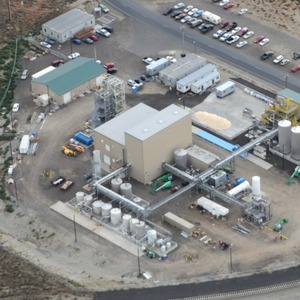ZeaChem to provide services to third parties at Boardman plant

ZeaChem Inc.
April 23, 2015
BY ZeaChem
In 2012, ZeaChem completed construction of its 250,000 gallon per year (biofuel equivalent) demonstration biorefinery in Boardman, Oregon. In 2013 ZeaChem successfully converted wood into cellulosic sugars, lignin, acids, esters and alcohols. The demonstration plant has been a critical stepping stone from lab and pilot scale to first commercial, the development of which is currently underway.
Fully cognizant of the challenges involved in scaling up, ZeaChem has realized the opportunity to take a supportive role in the industry to assist others with their own pre-commercial scale up efforts. As operational capacity at the demonstration plant becomes available, ZeaChem has decided to open its doors to third parties who wish to take advantage of ZeaChem's equipment packages and trained operations staff to assist them in their scale up efforts. And so, ZeaChem is pleased to announce the ZeaChem Technology Institute & Processing Services in Boardman.
The ZeaChem Technology Institute will enable third parties to scale their efforts in a much more cost-effective manner on a greatly accelerated timetable while avoiding the time, treasure and talent necessary to build, own and operate non-commercial demonstration facilities.
Advertisement
Advertisement
There are five types of customers who can benefit from working with ZeaChem in Boardman:
Specialty feedstock growers who wish to demonstrate the type and quality of cellulosic hydrolysates that can be produced from their crops.
Hydrolysis technologists who either want to run a particular combination of settings on ZeaChem's hydrolysis unit to produce hydrolysates, or who want to run the unit as a pretreatment system to create material that they further process with their own technology either on site or back home at their own facilities.
Biologic technologists, who have their own organism that wish to run in ZeaChem's seed train as a pilot scale unit or in the demonstration scale production fermenters.
Advertisement
Advertisement
Thermochemical technologists who wish to utilize ZeaChem's various catalytic reactors.
Technologists who have other processing units, such as advanced hydrolysis, recovery or thermochemical systems, that could either supplement or complement the design configuration of a biorefinery.
Related Stories
The U.S. Energy Information Administration maintained its forecast for 2025 and 2026 biodiesel, renewable diesel and sustainable aviation fuel (SAF) production in its latest Short-Term Energy Outlook, released July 8.
XCF Global Inc. on July 10 shared its strategic plan to invest close to $1 billion in developing a network of SAF production facilities, expanding its U.S. footprint, and advancing its international growth strategy.
U.S. fuel ethanol capacity fell slightly in April, while biodiesel and renewable diesel capacity held steady, according to data released by the U.S. EIA on June 30. Feedstock consumption was down when compared to the previous month.
XCF Global Inc. on July 8 provided a production update on its flagship New Rise Reno facility, underscoring that the plant has successfully produced SAF, renewable diesel, and renewable naphtha during its initial ramp-up.
The USDA’s Risk Management Agency is implementing multiple changes to the Camelina pilot insurance program for the 2026 and succeeding crop years. The changes will expand coverage options and provide greater flexibility for producers.
Upcoming Events










